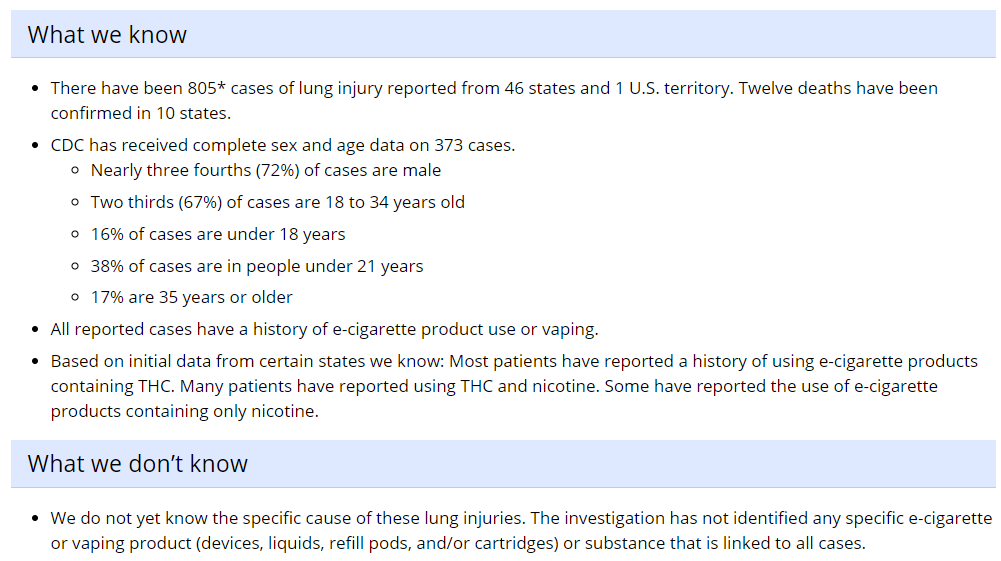The following piece was provided by State Sen. Will Brownsberger, D – Belmont, who also represents Watertown and parts of Boston.
On Sept. 24, Governor Baker declared a public health emergency and temporary ban on the sale of all vaping products in response to a multi-state outbreak of unexplained lung illnesses associated with vaping.
In effect until Jan. 25, the ban seeks to provide medical experts time to properly investigate the dangers associated with the use of electronic nicotine and marijuana products, which will assist the state in developing a response that could include new legislation or Department of Public Health (DPH) regulations.
At a Public Health Council meeting on Sept. 11, Commissioner Monical Bharel issued a mandate requiring clinicians statewide to report possible instances of vaping-related illness to DPH. The agency has since received 61 referrals and has forwarded five cases that have met federal criteria to the Centers for Disease Control and Prevention (CDC) for further examination. As of Sept. 26, the CDC has collected the following information on lung injury associated with e-cigarette product use nationwide:

Although conventional cigarette smoking has declined notably over the past several decades, 41 percent of high school students in Massachusetts reported having tried e-cigarettes in 2017, with 1-in-5 reporting regular use, according to DPH statistics. Current use of e-cigarettes among high school students is 6 times higher than the rate of use among adults, and vaping devices have become the most common tobacco product used by youth.
Given the industry’s nascence, gaps in scientific evidence and understanding still abound, including on the overall and long-term health impacts of vaping products and on their utility as combustible tobacco cessation devices.
Governor Baker’s emergency declaration authorizes local police departments, boards of public health, and the Cannabis Control Commission, which regulates the legal marijuana industry, to conduct compliance checks to ensure retailers and licensees remove all vaping products from their shelves. The state will also establish a standing pharmacy order for nicotine replacement products that individuals will be able to use their health insurance to purchase without a prescription.
Critics of the Governor’s ban have cited inconclusive data linking vaping-related lung illness to the legal market, concerns the ban may push individuals who use vapes into a dangerous, illicit market, evidence vaping has helped some people quit smoking, and the sudden impact on vaping businesses.
Following the Governor’s declaration, the legislature’s Joint Committee on Public Health voted unanimously Wednesday to advance a redrafted version of a bill – S.2357, An Act regulating flavored tobacco products – first filed by Senator John Keenan and Representative Danielle Gregoire that would prohibit the sale of all flavored tobacco products. House Speaker Robert DeLeo also suggested the House would develop comprehensive legislation aimed at long-term solutions to issues surrounding vaping.
Additional Resources:
The E-Cigarette Debate: What Counts as Evidence?, American Journal of Public Health, 2019.
Can Vaping Help You Quit Smoking?, Harvard Health Publishing, 2019.
A Randomized Trial of E-Cigarettes versus Nicotine Replacement Therapy, The New England Journal of Medicine, 2019.
Researchers Explore Health Effects of E-Cigarettes, U.S. Department of Health and Human Services, 2018.
Youth Tobacco Use in Massachusetts: Survey Results from 1995 to 2017, DPH, 2019.
Health and Risk Behaviors of Massachusetts Youth, DESE/DPH, 2019.
E-Cigarette Use Among Youth and Young Adults: A Report of the Surgeon General, U.S. Department of Health and Human Services, 2016.
Dank Vapes, TKO and Other THC Vaping Brands are Linked to Illness, New York Times, September 28, 2019
12 deaths from vaping so far. Compare that to 480,000 deaths per year from cigarettes, yet they are still legal.
https://www.cdc.gov/tobacco/data_statistics/fact_sheets/fast_facts/index.htm
Pure political grandstanding. Maybe Charlie is trying to get the RMV stories out of the headlines?
No, it’s very different. Cigarettes typically kill after decades of use. The five individuals who died after using vaping products did so almost immediately after their use, and healthcare professions still are unsure as to why (there is no commonality between the deaths). Until the mystery is solved, I support the ban. https://www.npr.org/2019/09/26/764790673/cdc-says-the-cause-of-vaping-related-deaths-is-still-a-mystery
They tried this 100 years ago but it was alcohol that was “evil” and ruined people’s lives. What happened with that? The beginning of organized crime. If someone wants to Vape, let them, since the product can always be purchased in surrounding states or thru the black market. This ban will only send many back to cigarettes which as far as I know has caused more than 12 deaths in a country of 325,000,000. You figure it out.